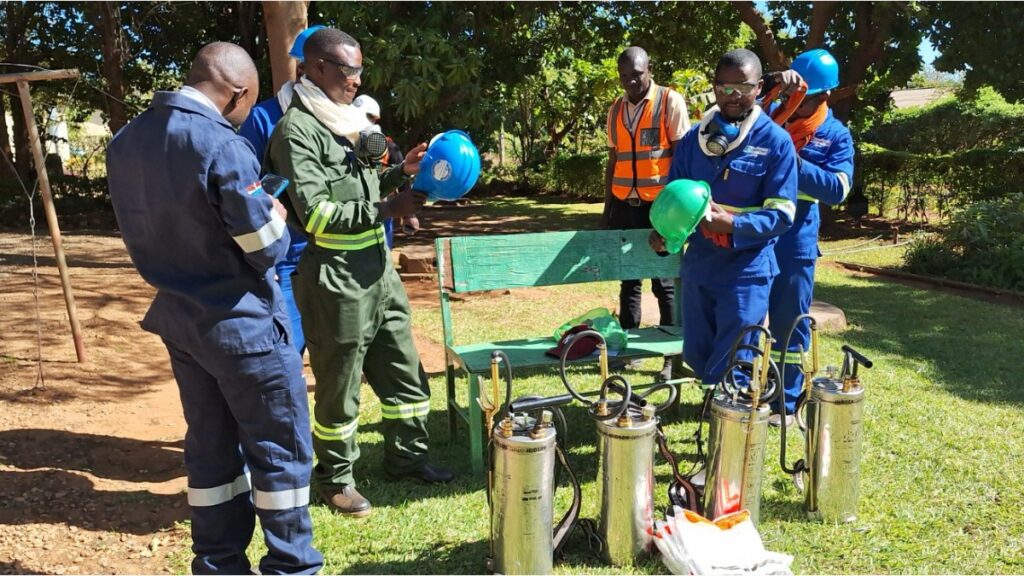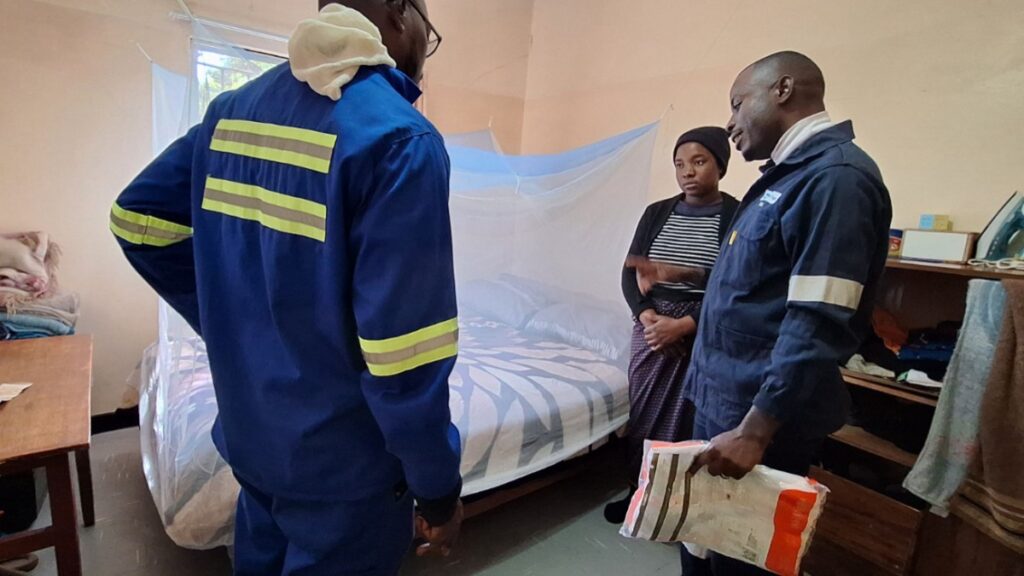End Malaria Councils and Funds are using innovative public-private partnerships to remove the barriers that slow progress against malaria reduction and elimination.
In Zambia, private sector coalition partners of the national End Malaria Council (EMC), such as Zambia Sugar, have taken significant steps to combat malaria in the country. Zambia Sugar has been a valued member of the EMC since its launch in 2019 and this case study highlights its commendable initiatives to support the fight against malaria.
Introduction
Zambia Sugar is a leading sugar producer in Zambia operating as a subsidiary of Illovo Sugar Africa. Zambia Sugar operates a sugar cane plantation and processing facility at the Nakambala Sugar Estates in the Mazabuka District of Southern Province.
The company grows sugarcane at its estate, and supports an outgrower scheme of small-scale farmers. It is one of the leading economic entities in the country contributing significantly to the economic landscape of the country.
At Zambia Sugar, the safety and well-being of all employees and the communities that it operates in is a top priority. The company implements comprehensive Safety, Health, Environment, Risk, and Quality (SHERQ) programmes that ensure sustained operations in a safe and responsible manner. It invests in social development programmes that promote education, health and economic empowerment in the communities where they operate.
Taking a proactive stance against the prevention and cure of serious diseases, including malaria, helps maintain the organisation’s social license to operate in the community. However, its engagement in many community programmes goes beyond its social cooperate responsibility.

Social investment
Zambia Sugar has an active social investment programme structured to address the specific needs of its surrounding communities. Prospective projects are considered on the basis that they are motivated by members of the local community and employee-appointed company representatives. To gain company support, projects must be shown to:
- be meaningful and sustainable
- reach and benefit as many people as possible
- have on-going community participation
Investing in malaria control as a core business strategy
Before establishing a fully-fledged malaria programme consisting of malaria prevention, education, treatment and community engagement, Zambia Sugar had a lot of absenteeism from work because of malaria illnesses. Very often, either an employee or a close family member would fall sick from malaria, and this would result in absence from work. As a result, malaria was preventing employees from contributing their best towards production of sugar which is the primary focus of the company.
Dr Charles Machila, Chief Medical Officer at Zambia Sugar reported that the majority of sick staff admitted or treated at the company’s on-site health care clinics were also observed to be malaria cases and often the number of malaria cases would exceed the available bed capacity of the company’s health facilities. It was then realised that something needed to be done to address the burden of malaria and reduce the assumed impact it was having on the company.
An evaluation conducted in Zambia in 2019, showed that private sector employees in Zambia miss an average of 4 days for each malaria episode and employees miss an additional 2.5 days to care for their families when they have malaria. The report showed that 16.3 million days per year are lost annually by private sector employees due to malaria and businesses were losing between US$606 to US$747 million in revenue and indirect costs from productivity loses. In addition, businesses were losing an additional US$15.2 million in direct costs for diagnosis, treatment and prevention of malaria in employees.
The evaluation also showed that eliminating malaria would provide an economic return of between 15 to 29 times the investment. The results made it clear that there was a strong business case to invest in malaria prevention. The case for investing in malaria control at Zambia Sugar thus went beyond community social responsibility.
Action against malaria
In close collaboration with the Zambia National Malaria Elimination Centre (NMEC), the following were key approaches that Zambia Sugar took to incorporate fighting malaria into their core business:
Employee health education and awareness programmes
Zambia Sugar introduced health promotion programmes to educate employees and their families on malaria prevention strategies as well as encourage them to seek medical assistance promptly if they exhibit malaria symptoms.
Larviciding and biological control
The estate is in a swampy area and furrow irrigation is used in most of the sugar cane fields. Recognising that the nature of its business results in water being everywhere, the company deliberately ensures that the stagnant water does not provide a conducive environment for mosquito breeding.
The company uses larviciding in stagnant water and conducts weekly monitoring of all stagnant water, sharing this information with the district and national malaria programme monthly.
In areas where insecticides could not be used, larvivorous fish were introduced demonstrating the company’s commitment to control mosquito populations.
Indoor residual spraying (IRS)
By setting a policy targeting 98% coverage in indoor residual spraying, Zambia Sugar ensures comprehensive protection against malaria transmission within its structures. Support from the company’s administrative and community structures, as well as management support has been vital for the success of this initiative.
Long-lasting insecticidal nets (LLIN) distribution

The company also procures nets for migrant workers in alignment with the national guidelines for malaria prevention ensuring vulnerable populations are protected.
Malaria surveillance and visitor management
The company conducts active and passive malaria surveillance within the gated sugar estate community and ensures all visitors from high malaria-endemic areas are tested. The company established structures under the community health services and facilities unit. This helps in monitoring and preventing malaria transmission within the estate. Prompt treatment for visitors found with malaria and education on prevention further supports malaria control efforts.
Healthcare provision
The company provides quality medical services to sustain the health of all employees and their immediate families. The company provides this service through company owned on-site medical clinics, including a fully-fledged state of the art Nakambala Estate Zambia Sugar Hospital and four clinics in Kaleya, Lubombo, Nkabika and Chuula.
Malaria testing is done using rapid diagnostic tests or microscopy at these facilities. In line with national guidelines, only confirmed malaria cases are treated with an antimalarials. The company also employs community health workers within the sugar estate to provide healthcare services, including providing them with rapid diagnostic tests for malaria diagnosis and Coartem (artemether and lumefantrine) for first line treatment.
Zambia Sugar’s state-of-the-art hospital, medical clinics and community health workers not only provide treatment to their own employees and their families but also offer the services to surrounding community members.
Migrant worker health checks
A significant percentage of migrant workers are from the highly malaria endemic areas such as the Western province and often come with asymptomatic parasitaemia. To prevent malaria outbreaks within the workforce, Zambia Sugar proactively conducts entry medical checks, including:
- malaria testing
- treatment, and provision of antimalarial prophylaxis for migrant labourers from endemic regions in line with Zambia’s malaria elimination strategic plan
Resource mobilisation for malaria
Zambia Sugar has representation on the Zambia End Malaria Council at national and subnational levels (district) and is a key sponsor of several malaria fundraising initiatives.
Provision of support to the district health team (Mazabuka District)
The company also provides support to the health district management team in areas where they have gaps or challenges. For example, Zambia Sugar:
- conducted refurbishment of the Nakambala Urban Clinic which offers services to over 600 patients daily as well as the rehabilitation of two wards at the Government Mazabuku District Hospital. This was done in a collaborative manner with the government to help improve health care delivery in the district.
- works in collaboration with the National Malaria Elimination Centre during the nationwide mass LLIN campaigns to support in the distribution of LLINs to children under 5 and mothers within the estate.
- provides the district with larvivorous fish to support its mosquito control interventions.
- sponsored a phased upgrade of the Mazabuka community radio station to ensure 1.8 million listeners could continue to benefit from its services including sensitisation on malaria prevention and treatment.
- Zambia Sugar has health teams that work in their onsite clinics, conduct IRS, and distribute LLINS. Some members of these teams are also members of the district malaria technical working groups where they provide technical guidance.
Impact
Malaria burden reduction
Zambia Sugar was able to reduce the incidence of malaria from within the plantation from about 660 malaria cases per 1,000 people in 2000 to 1.8 malaria cases per 1,000 people of malaria in 2023.
The financial burden on the company-supported health facilities has reduced following the significant reduction of malaria cases in the sugar estate.
They have also has reported zero ‘indigenous’ malaria cases from its sites for several years running and new cases are now primarily ‘imported cases’ – from employees who recently travelled out of town, visitors to the estate or school children returning from boarding school.
Enhanced impact of malaria initiatives
By leveraging the resources from Zambia Sugar, the district health team and Zambia government have been able to extend their community reach and enhance the impact of their efforts towards malaria reduction.
Improved employee productivity
The company recognised a significant impact on investment in malaria prevention and elimination including reduction of the number of sick days taken due to malaria, decreased health costs (including the costs associated with hospitalisation of malaria cases at the company supported clinics and hospital), improved employee morale and improved employee productivity.
Promotion of innovative approaches and best practices by other private sector companies
The company continues to support stakeholders fighting to end malaria. This is done by sharing best practices in malaria control and elimination with fellow members in the EMC, of which it is a member and with other companies.
Private sector companies have also visited Zambia Sugar to learn lessons on how to invest in malaria control. Sharing lessons learned with private sector companies and corporate partners not only benefits those organisations but also contributes to broader efforts to combat malaria effectively. Encouraging others to emulate successful initiatives fosters a culture of collaboration and a shared commitment to making a positive impact in the fight against malaria. By disseminating experiences and information, Zambia Sugar is amplifying the overall impact of its efforts in tackling malaria.
For example, after a hiatus of 30 years, the Zambia national IRS programme was restarted in 2003 with the technical support of Konkola and Mopani Copper Mines and Zambia Sugar, who had already been running successful IRS operations for many years.
First Quantum, a multinational oil and gas company, and an End Malaria Council member, is another example of a company with a successful partnership with the national government of Zambia implementing malaria prevention programmes in the areas in which it operates. In 2019, the national malaria programme in Zambia reported to the EMC, a lack of resources to transport insecticide to the North-Western province, which threatened the planned vector control campaign. First Quantum Minerals loaded the insecticides and other malaria commodities onto trucks it was already running to and from the province, which allowed the campaign to go forward as planned.
Strengthening of public-private partnerships
The President of Zambia nominated the Zambia Sugar chairperson as the country’s End Malaria Goodwill Ambassador. His nomination and active involvement highlights the significance and his dedication to this cause. It also reinforces the importance of public-private partnerships and individual commitments in addressing malaria challenges and ultimately contributing to the country’s malaria elimination efforts.
Conclusion
The establishment of End Malaria Councils plays a crucial role in the broader strategy of private sector support for malaria control and eradication efforts. The councils serve as collaborative platforms that unite various stakeholders, including businesses, non-profit organisations, government entities, and community leaders, creating a cohesive and organised approach to tackling malaria.
By fostering collaboration, knowledge exchange, and resource pooling, councils not only improve health outcomes in malaria-affected regions but also promote long-term economic benefits that resonate throughout communities and industries alike. This integrated approach underscores the potential of private sector engagement to generate transformative change in global health while simultaneously advancing corporate interests.
In Zambia, the EMC provided a vital framework for unifying private sector support for malaria control and eradication efforts going beyond social responsibility and yielding various compelling benefits for both businesses and society as a whole.
Investing in malaria prevention and treatment can lead to long-term economic benefits by:
- reducing healthcare costs
- increasing workforce productivity
- promoting sustainable development in malaria-affected regions.
